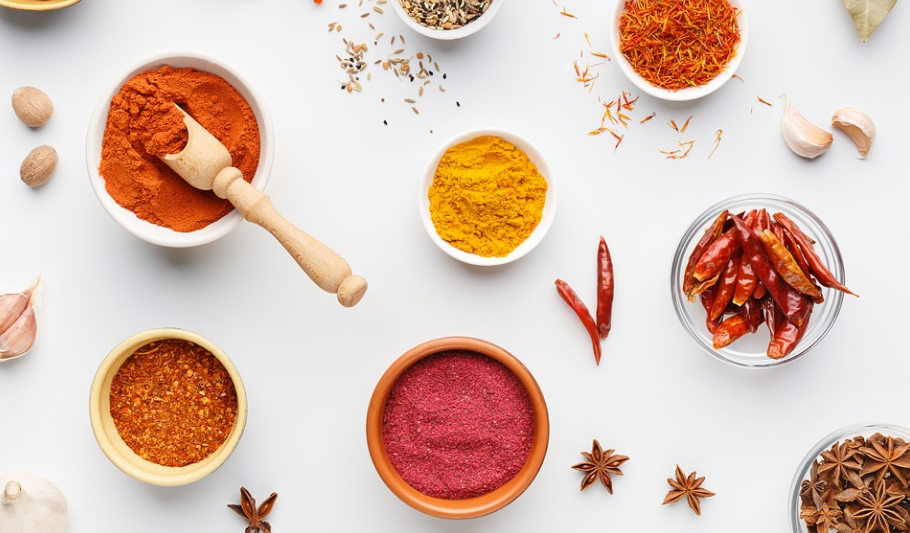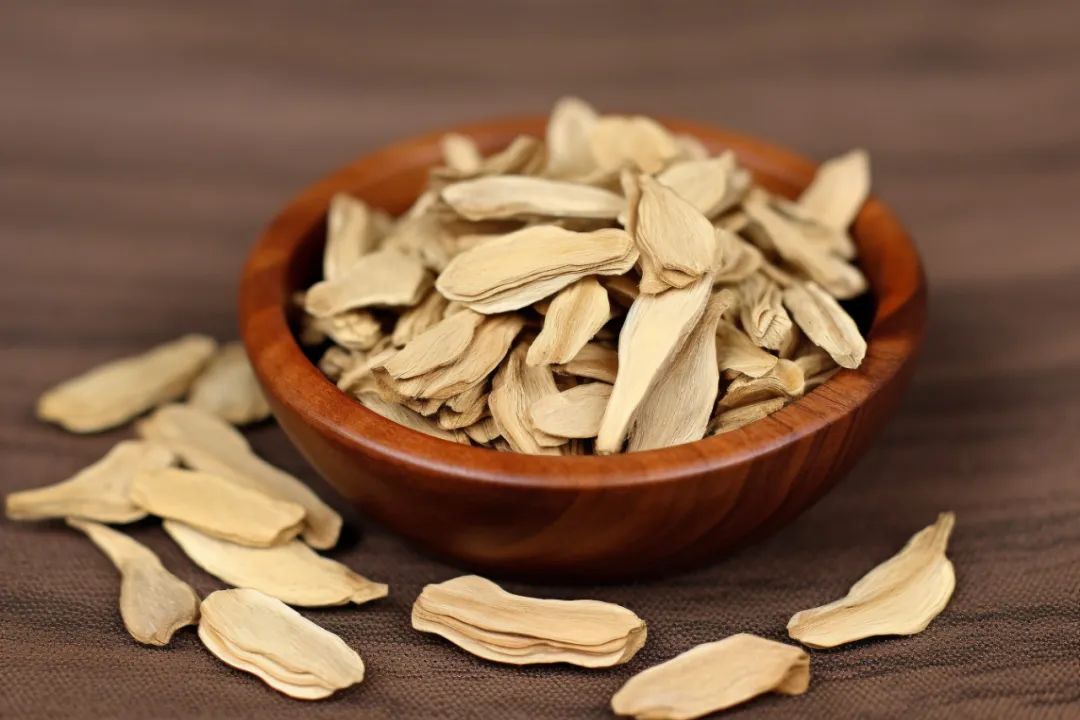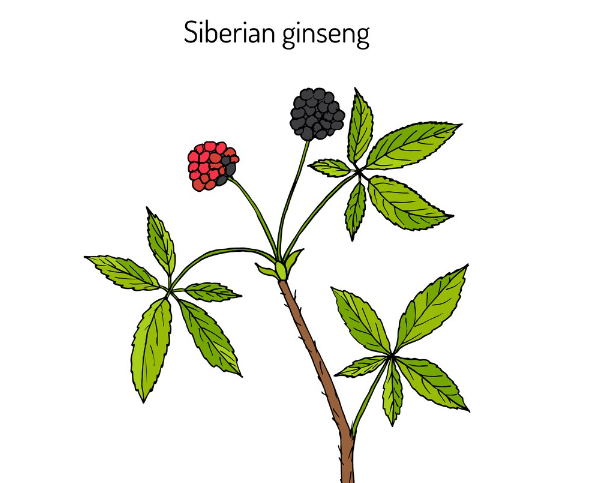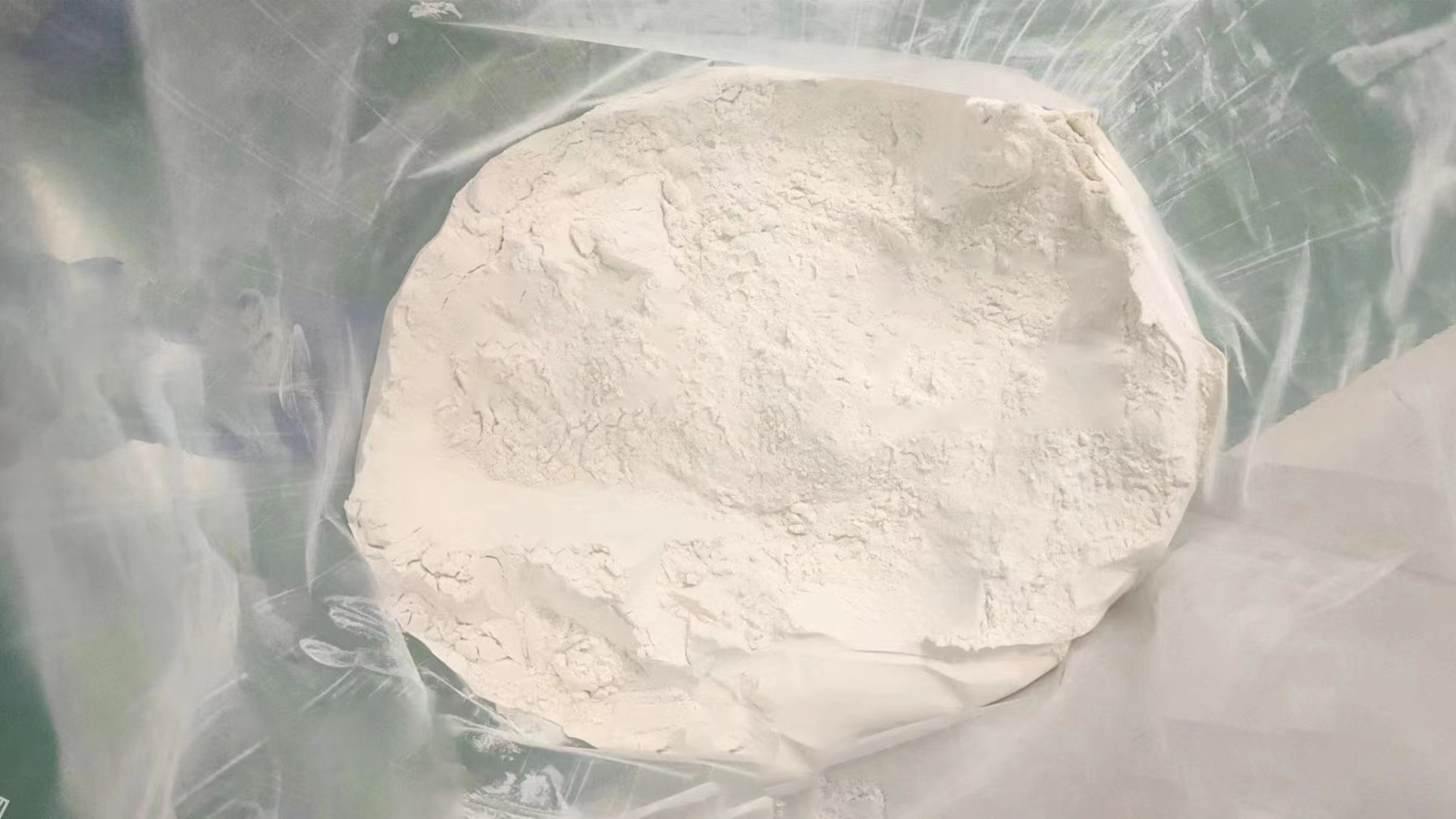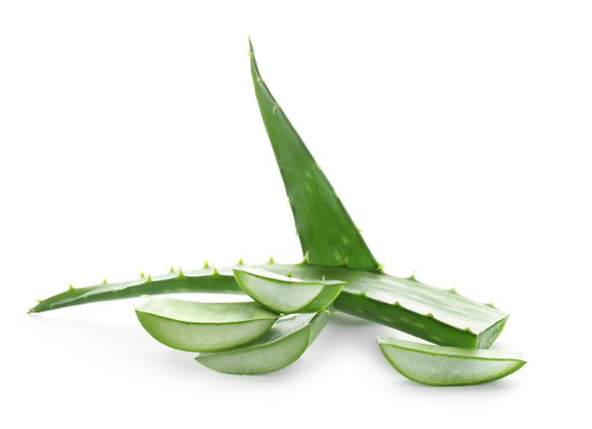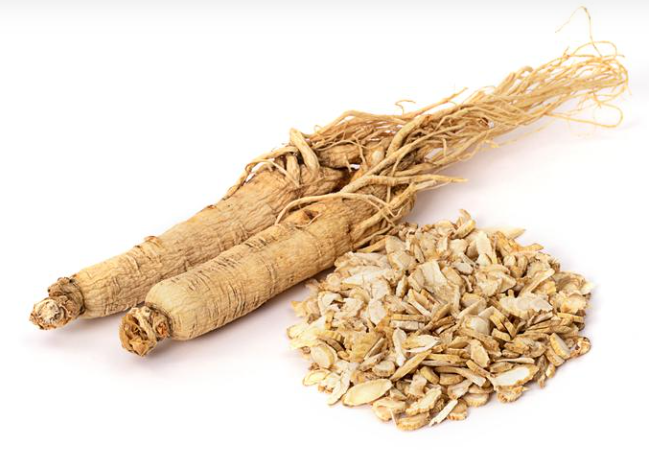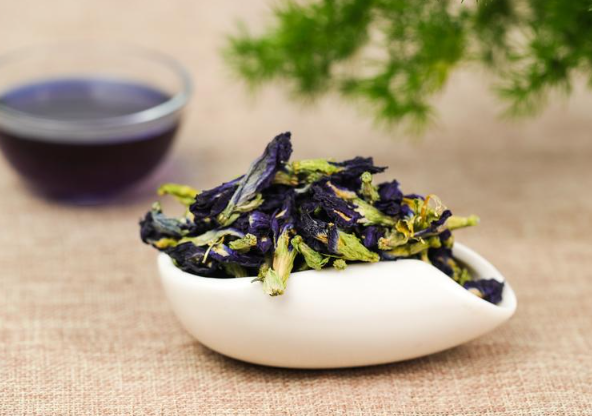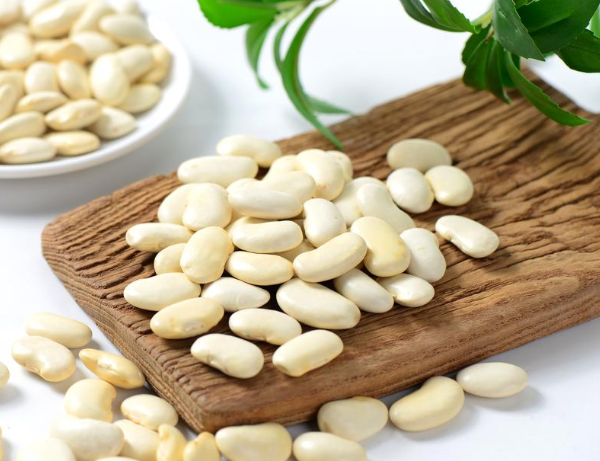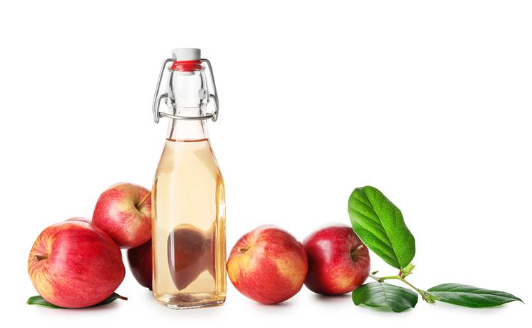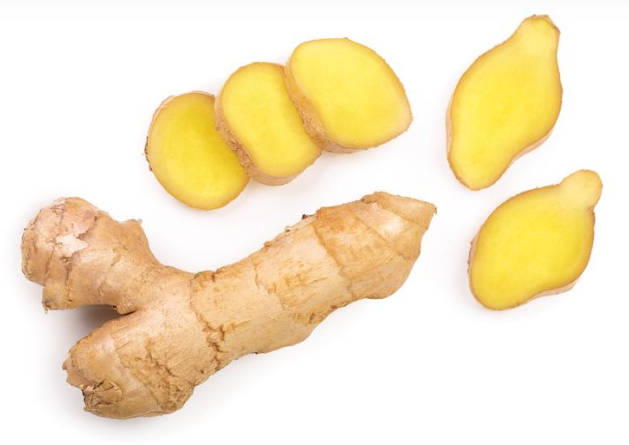In today's society, blood sugar health has become a widely discussed topic. Many people are realizing that dietary choices play a crucial role in regulating blood sugar. In fact, our diet can influence the sensitivity of insulin, which, in turn, affects our blood sugar levels.
First, let's understand what insulin is and its connection to blood sugar. Insulin is a vital hormone that helps lower blood sugar levels. However, if we consume a high-carbohydrate diet over an extended period, our bodies may become insensitive to insulin, leading to insulin resistance and ultimately, high blood sugar, a primary symptom of diabetes[1].
So, how can we use our diet to help regulate blood sugar? The answer may lie in specific food components. Scientific research has identified natural food ingredients such as mulberry leaf extract, sea buckthorn protein peptides, and L-arabinose, which can improve blood sugar levels through various mechanisms. These methods include carbohydrate blocking, pancreas repair, and microbiome regulation. But what makes these food ingredients special, and why do they have such a significant impact on blood sugar?
In this article, we will delve into these three natural food ingredients, exploring how they affect blood sugar regulation and how to incorporate them into our daily diet. Whether you already have blood sugar concerns or simply want to maintain blood sugar health, this blog post will provide valuable insights to help you better understand the connection between food and blood sugar. Let's unravel this crucial health mystery together!
1. Sea Buckthorn Protein Peptides: Pioneering Blood Sugar Management and Kidney Protection
Sea buckthorn protein peptides have emerged as a game-changer in the field of blood sugar health management. With an impressive track record of seven patented inventions and six high-impact core or SCI research papers, they have solidified their position as a core player in the domain of blood sugar management.
These exceptional peptides showcase significant blood sugar-lowering activity and offer robust protection to the kidneys, marking a turning point for those seeking improved blood sugar control. Experimental studies have revealed a substantial reduction in fasting blood sugar levels in high-blood-sugar mice, alongside an improvement in the classic "three highs and one low" symptoms. Additionally, sea buckthorn protein peptides have proven to alleviate the pathological changes in the kidneys induced by high blood sugar.
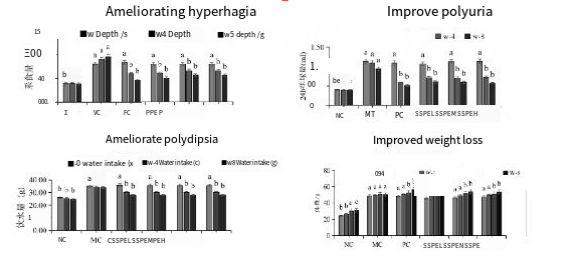
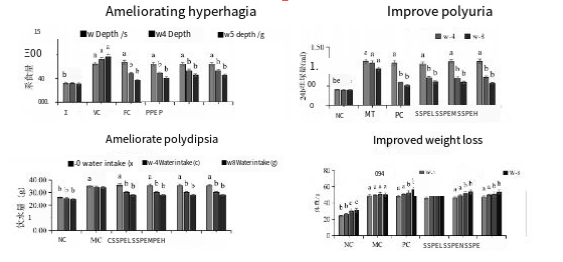
Enhancing Kidney Function: In control group mice, blood cell distribution is uniform, and there are no noticeable pathological changes in the kidney glomeruli or renal cysts. In contrast, high blood sugar group mice exhibit irregular blood cell distribution, compressed renal cysts, thickened basement membranes, and a broader mesangial area—all classic pathological signs of diabetic kidney disease. Sea buckthorn protein peptides have demonstrated their ability to significantly ameliorate these symptoms, indicating their substantial protective effect on the kidneys.
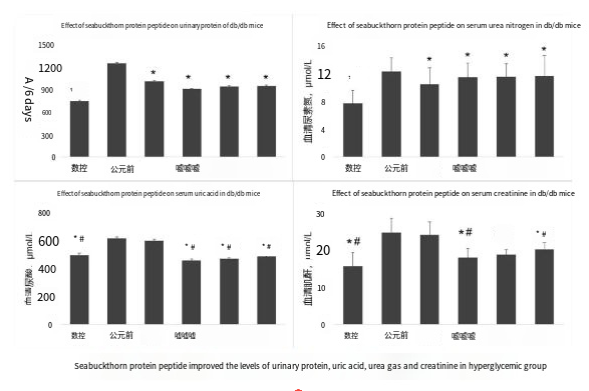
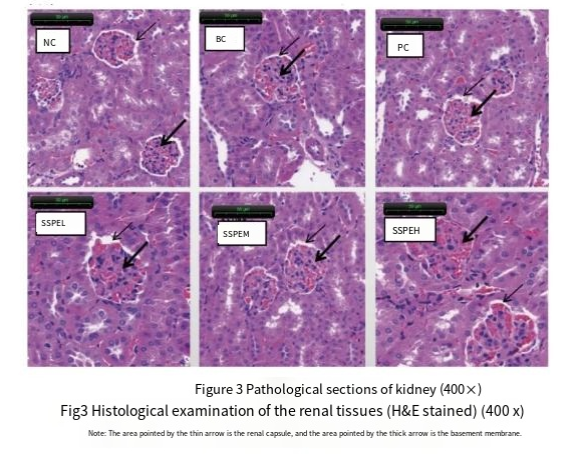
With their remarkable attributes and a growing body of evidence, sea buckthorn protein peptides are poised to revolutionize blood sugar management and offer newfound hope for individuals seeking enhanced kidney protection and overall health.
2. Mulberry Leaf Extract: A Remarkable Natural Remedy Acknowledged in Chinese Diabetes Guidelines
Mulberry leaf extract, a substance with dual medicinal and dietary significance, has earned its place in the "Adult Diabetes Dietary Guidelines" published by the Chinese National Health Commission.In the 1970s, researchers made a groundbreaking discovery by identifying DNJ (1-deoxynojirimycin) in mulberry leaves. In 1995, it was confirmed to be the active blood sugar-lowering component of mulberry leaves. Structurally resembling glucose, DNJ possesses the following capabilities:
1). Inhibition of α-glucosidase: DNJ acts as an inhibitor of α-glucosidase, slowing the absorption of sugar from food and reducing post-meal blood sugar levels.
2). Inhibition of glycogen phosphorylase: It serves as an inhibitor of glycogen phosphorylase, restraining the breakdown of liver glycogen and stabilizing fasting blood sugar levels.
This natural wonder, with its proven effectiveness and recognition in official guidelines, is a powerful tool in the management of blood sugar levels, offering individuals a more natural and holistic approach to diabetes control.
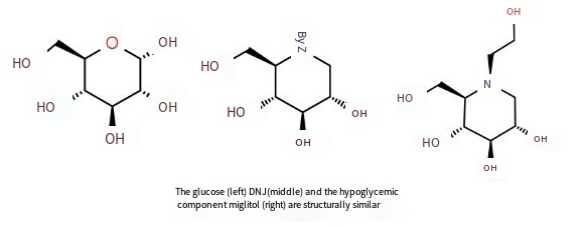
A. High DNJ Content: Elevating the Blood Sugar Regulation Potential of Mulberry Leaf Extract
DNJ (1-deoxynojirimycin) is a pivotal active component in mulberry leaf extract when it comes to regulating blood sugar. To optimize its ability in blood sugar control, various strategies are employed to enhance the DNJ content in mulberry leaf extract. These methods include:
- Specific Processes: Employing advanced techniques such as 10-fold extraction and membrane filtration to concentrate DNJ, resulting in an astounding DNJ content of over 1%.
- Particular Geographic Regions: Extensive research and surveys are conducted to pinpoint regions with higher DNJ content in mulberry leaves.
- Specific Harvest Times: Selecting the months of July to September, characterized by higher average DNJ content, for mulberry leaf collection.
B. Research on Mulberry leaf extract Blood Sugar Reduction Efficacy: Clinical trials have conclusively demonstrated the blood sugar-lowering effects of mulberry leaf extract. When individuals simultaneously consumed mulberry leaf extract with varying doses (DNJ content of 6mg, 12mg, 18mg) along with 50g of sucrose, there was a significant reduction in blood sugar peaks. The post-meal blood sugar curve displayed a noticeable decrease in its ascent, resulting in lower post-meal blood sugar levels. Moreover, when 60g of rice porridge (approximately 50g of carbohydrates) was consumed alongside mulberry leaf extract (containing 8mg of DNJ), the extract reduced the area under the blood sugar curve by 24.1%. This evidence underscores the ability of mulberry leaf extract to lower post-meal blood sugar levels and stabilize blood sugar curves, contributing to an improvement in blood sugar health.
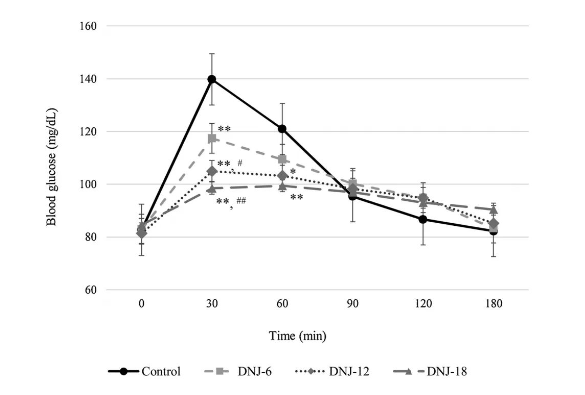
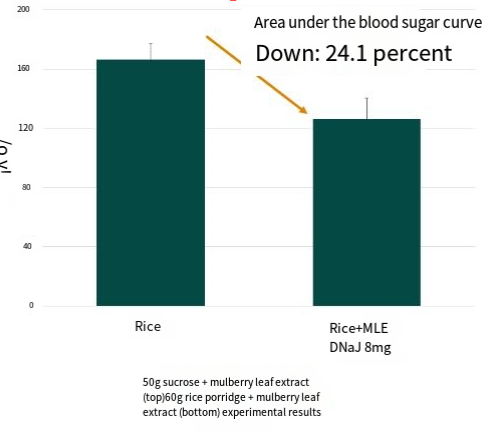
3. L-Arabinose: A Certified Blood Sugar Regulator and Gut Health Enhancer
L-Arabinose has earned multiple national regulatory certifications, including the prestigious US GRAS certification and its inclusion in Japan's Specific Health Food Ingredients Directory for blood sugar regulation. In China, it has been approved as a new resource food derived from cereal fiber, such as corn cobs and corn bran, with usage permitted in various food products excluding infant and toddler foods.
What sets L-Arabinose apart is its sweetness, which ranges from 50% to 60% of that of sucrose, offering a pure and gentle sweet sensation. However, it's virtually unusable by the human body, devoid of calorie production, and has no impact on blood sugar levels.
1. Sugar Reduction Function: Research reveals that L-Arabinose can inhibit 56.2% of sucrase activity in the porcine intestinal mucosa, reducing the absorption of sucrose in the gut. It can also ameliorate fasting blood sugar abnormalities in mice induced by high-fat diets and post-meal blood sugar levels, leading to a smoother blood sugar curve.
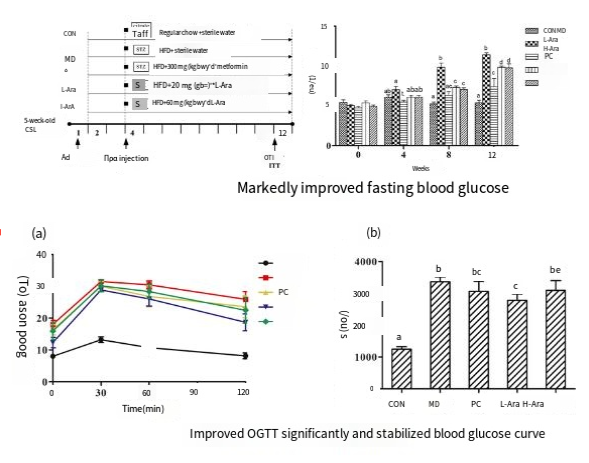
2. Gut Regulation Function: Experiments indicate that adding 1% L-Arabinose to a diet consisting of 20% sucrose, compared to a diet without L-Arabinose, increases cecum weight in rats and reduces fecal dry weight. Moreover, it boosts the population of bifidobacteria in the gut. Furthermore, it improves the levels of thick-walled bacteria and rod-shaped bacteria in the feces of diabetic rats while reducing the F/B ratio.
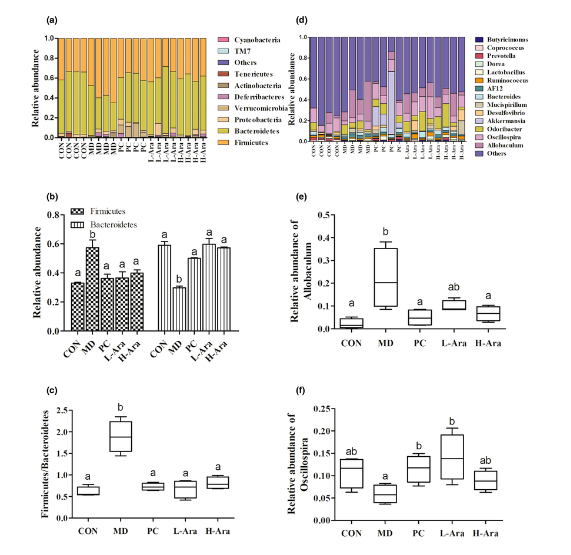
These findings highlight the potential of L-Arabinose in modulating the gut microbiota, which, in turn, aids in restoring pancreatic β-cell function and enhancing the body's blood sugar regulation capacity. L-Arabinose, with its dual role in blood sugar management and gut health, offers a promising avenue for those seeking a holistic approach to diabetes control.
Ref:
1.In accordance with the "Chinese Guidelines for the Prevention and Treatment of Type 2 Diabetes (2020 Edition)" [1], it is evident that proper dietary choices play a pivotal role in managing blood sugar.
2.A study conducted by Shu Danyang and colleagues [2] investigated the blood sugar-lowering activity and kidney-protective effects of sea buckthorn seed protein peptides in db/db mice. The results demonstrated their remarkable potential in this regard.
3.Further research by Shu Danyang [3] delved into the antioxidative activity of sea buckthorn seed protein hydrolysates and their efficacy in lowering blood sugar levels, as well as their protective effects on the kidneys in mice.
4.In a randomized controlled study by Thaipitakwong et al. [4], the dose-finding, efficacy, and safety of mulberry leaves on glycemic profiles in obese individuals with borderline diabetes were assessed. The results shed light on the potential of mulberry leaves in blood sugar management.




